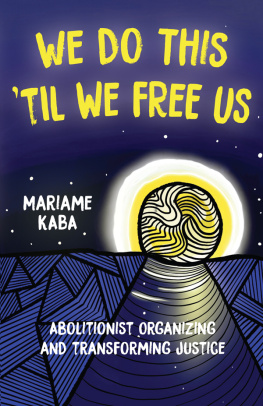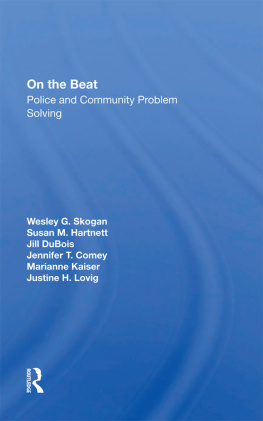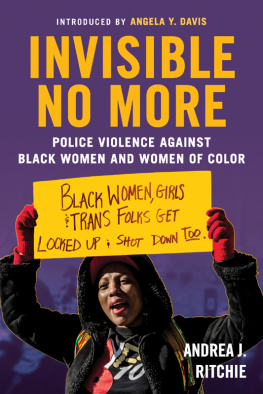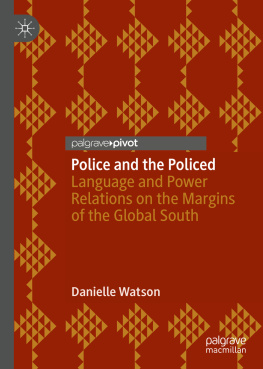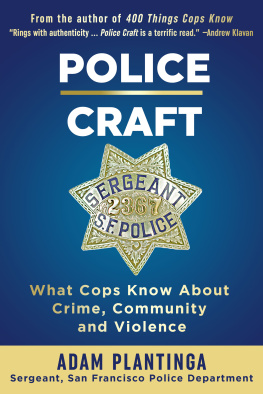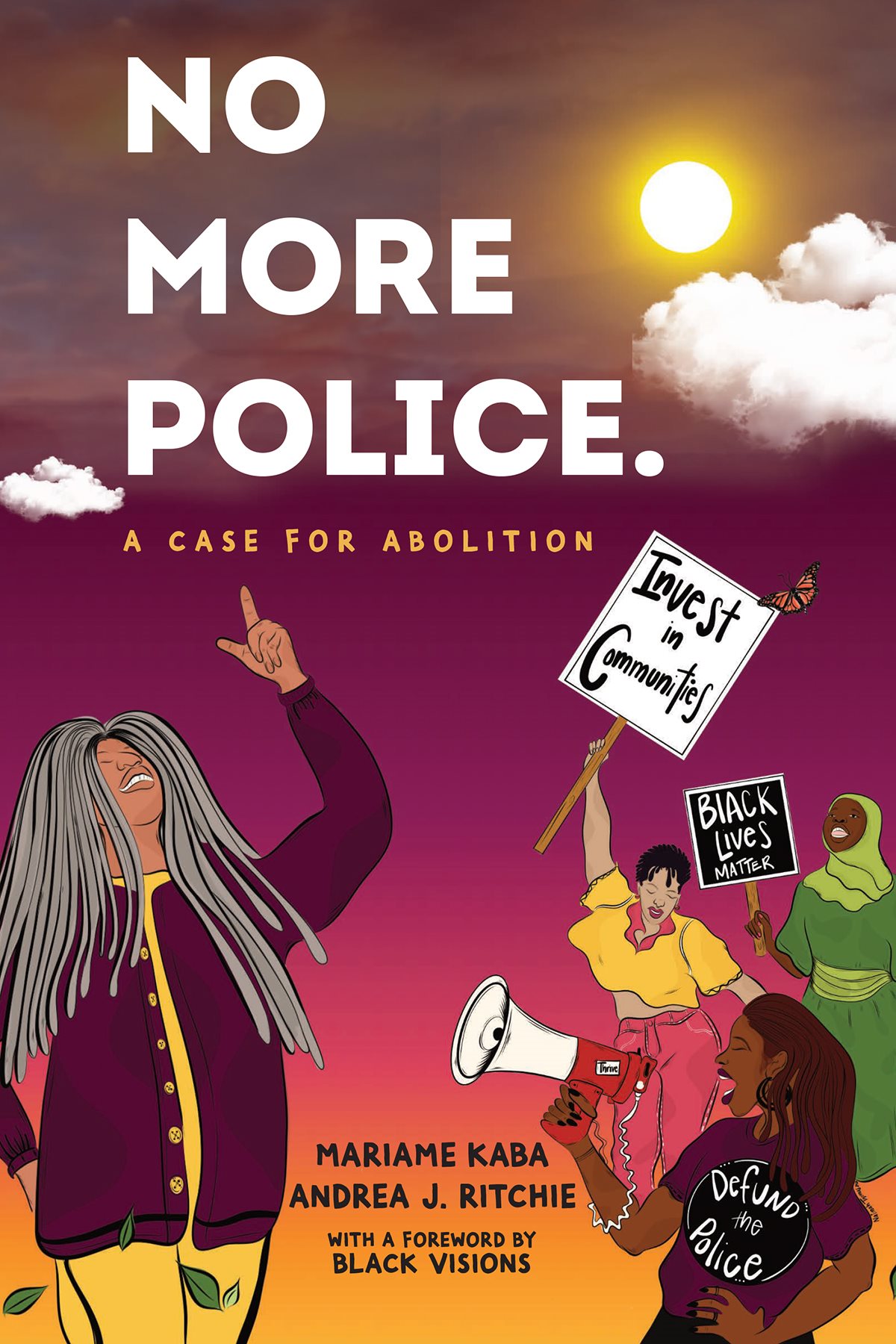Contents
Guide
Pagebreaks of the Print Version
Additional Praise forNo More Police.
With No More Police, Mariame Kaba and Andrea Ritchie have written the definitive text on police abolition. The magic of this book is its ability to address the practical concerns of the present while strengthening our ability to craft ambitious and transformative freedom dreams for the future. Carefully researched, passionately written, and persuasively argued, No More Police is a must-read text for policymakers, activists, educators, and anyone else committed to imagining and building beyond the carceral world.
Marc Lamont Hill, author of We Still Here: Pandemic, Policing, Protest, and Possibility
In the powerful and generative tradition of Black feminist freedom-making, No More Police not only presents a compelling case for the abolition of police, but points us in the direction of building a safer and more just future. Ritchie and Kaba have worked for decades in transformative justice and abolitionist movements. The richness of that experience, the love that fuels it, and the brilliant insights that flow from it, shine brightly in this book.
Barbara Ransby, activist, author, and historian
An absolutely brilliant contribution. Black feminist abolitionists Kaba and Ritchie have issued a passionate mandate that we build relations and organizations that get it right so that we avoid cooptation, learn from our mistakes, embrace an anti-oppression approach to the work, and never give up on the vision of a world where justice and safety live alongside each other. Generous and compelling, No More Police is a timely and critical intervention; essential reading as we continue to optimistically and faithfully fight for freedom.
Beth Richie, author of Arrested Justice
No More Police makes a sharp and compelling Black feminist case for a world without police, and without policing. Kaba and Ritchie are movement veterans, and their writing is as meticulously researched as it is grounded in practical knowledge gleaned over decades of abolitionist movement work. At once theoretically nuanced, analytically insightful, and highly accessible, No More Police is an essential, must-read book for this moment. It is sure to become a mainstay for longtime and new organizers, and for anyone invested in learning what it will take to build a movement and get free.
Robyn Maynard, author of Policing Black Lives: State Violence in Canada from Slavery to the Present and co-author of Rehearsals for Living
More than a synthesis and summation of the conditions of our movements work over the last two years, and more than just an abolitionist movement timeline going back decades, Kaba and Ritchie weave together our collective stories, contradictions, tensions and all, and gift all of us and future generations with a map to a future free of cops and cages and full of care. This is a must-read in the abolitionist lexicon.
Ash-Lee Woodard Henderson, Movement for Black Lives and co-director of the Highlander Center
Kaba and Ritchie provide a much-needed primer on the demand to defund the police and how that demand can be leveraged toward an even more fundamental transformation of the violence of policing. The authors root their analysis in the reality of todays movements and offer practical, concrete recommendations that activists and organizers can put to work right now.
Rachel Herzing, co-author of How to Abolish Prisons
Kaba and Ritchie are such trusted souls in Black Liberation movements and No More Police passionately synthesizes the experiences and expertise necessary for building a new world with less violence on all fronts.
Raquel Willis, author, activist, and board president, Solutions Not Punishment Collaborative
Also by Mariame Kaba
See You Soon (illustrated by Bianca Diaz)
We Do This Til We Free Us: Abolitionist Organizing and Transforming Justice
Fumbling Towards Repair: A Workbook for Community Accountability (with Shira Hassan)
Missing Daddy (illustrated by bria royal)
Also by Andrea J. Ritchie
Invisible No More: Police Violence Against Black Women and Women of Color
Say Her Name: Resisting Police Brutality Against Black Women (with Kimberl Crenshaw)
Queer (In)Justice: The Criminalization of LGBT People in the United States (with Joey L. Mogul and Kay Whitlock)

To all the dreamers and organizers building new worlds,in honor of all the people killed, criminalized, and harmed in this one.
Once upon a time there was a dream. A dream of turning the world all over.
Pat Parker
Contents
Foreword
May 25, 2020, is a day we will never forget.
It was actually a nice day in Minneapolis on May 25 (not always guaranteed in the Midwest). Miski went to bed early with a migraine. Kandace sent her partner to the store to get supplies for a socially distanced cookout with their home pod. They almost went to Cup Foods, which sits two blocks from their front steps. At the last minute, Kandace asked them to get in the car instead so they could go to the grocery store and grab a few fresh ingredients. Not a day goes by that Kandace doesnt think about what could have happened if their partner had run that errand to Cup.
At 7:34 p.m. at Cup, a forty-six-year-old security guard who had lost his job during the pandemic showed up for a pack of cigarettes. Within hours, both of us received a flood of texts: Police had killed an unarmed Black man in front of Cup. By noon the following day, we knew his name: George Floyd.
We both navigated the familiar outpouring of love and concern from comrades and friends across the country. Are you okay? Im so sorry. Can I support you in any way? What do you need? Questions we never have the answer to but have to figure out quickly. Viral Black death meant the world knew about Georges murder before Minneapolis got to process, let alone grieve. We were just coming to grips with the change happening around us. But the call to become a shaper of this change is strong and vital.
We both masked up and joined the massive protests starting at what is now George Floyd Square, marveling at the sheer number of people who braved the uncertainty of the pandemic to come together to march, shoulder to shoulder, in outrage, grief, and a powerful demand for justice.
In the days that followed, wed be asked over and over: why is this moment different? We remember thinking that nothing and everything was different. The same cycle of emotions but against the backdrop of a pandemic. People no longer had the regularity of their life patterns, their activities, or their habits to distract them from the truththe truth that capitalism is failing us, and failing us hard, the truth of the weight of the consistent violence and abuse that Black people experience at the hands of the state.
Organizing can never take credit for the energy and will of the community. What it can do is provide a container to understand the moment and build toward collective solutions to address our individual pain.
We got together with other organizers at Black Visions, a power- and base-building organization we, along with five others, co-founded, and allies at Reclaim the Block, another grassroots justice group in Minneapolis. Within twenty-six hours, we released a petition that demanded the defunding of the Minneapolis Police Department (MPD).


